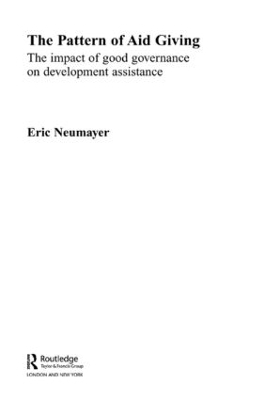
The Pattern of Aid Giving
The Impact of Good Governance on Development Assistance
Seiten
2006
Routledge (Verlag)
978-0-415-40695-6 (ISBN)
Routledge (Verlag)
978-0-415-40695-6 (ISBN)
Using econometric analysis, the author examines factors that determine patterns of aid giving including aggregate aid flows, aid from multilateral organisations and aid from bilateral donors such as Germany, Japan, the US and Arabia.
Practically all donor countries that give aid claim to do so on the basis on the recipient's good governance, but do these claims have a real impact on the allocation of aid? Are democratic, human rights-respecting, countries with low levels of corruption and military expenditures actually likely to receive more aid than other countries?
Using econometric analysis, the author examines the factors that really determine the patterns of aid giving. The author analyses such examples as:
* aggregate aid flows
* aid from multilateral organisations such as the EU and the UN
* aid from bilateral donors such as Germany, Japan, the US as well as Arab donors.
This concise, well argued and well researched book will be a great read for students, academics and policy-makers involved in development studies, economics and international relations.
Practically all donor countries that give aid claim to do so on the basis on the recipient's good governance, but do these claims have a real impact on the allocation of aid? Are democratic, human rights-respecting, countries with low levels of corruption and military expenditures actually likely to receive more aid than other countries?
Using econometric analysis, the author examines the factors that really determine the patterns of aid giving. The author analyses such examples as:
* aggregate aid flows
* aid from multilateral organisations such as the EU and the UN
* aid from bilateral donors such as Germany, Japan, the US as well as Arab donors.
This concise, well argued and well researched book will be a great read for students, academics and policy-makers involved in development studies, economics and international relations.
Eric Neumayer is Lecturer in Environment and Development at the London School of Economics, UK.
1. Introduction 2. Good Governance and its Relation to Aid 3. Overview of Existing Studies 4. Research Design 5. Aggregate Aid, Western Bilateral and Multilateral Aid 6. The Arab Donors 7. Analysis and Discussion of Results 8. Testing the Robustness of Results 9. Conclusions
| Reihe/Serie | Routledge Studies in Development Economics |
|---|---|
| Verlagsort | London |
| Sprache | englisch |
| Maße | 156 x 234 mm |
| Gewicht | 204 g |
| Themenwelt | Sozialwissenschaften ► Politik / Verwaltung ► Europäische / Internationale Politik |
| Sozialwissenschaften ► Soziologie ► Spezielle Soziologien | |
| Wirtschaft ► Volkswirtschaftslehre ► Makroökonomie | |
| Wirtschaft ► Volkswirtschaftslehre ► Ökonometrie | |
| ISBN-10 | 0-415-40695-1 / 0415406951 |
| ISBN-13 | 978-0-415-40695-6 / 9780415406956 |
| Zustand | Neuware |
| Informationen gemäß Produktsicherheitsverordnung (GPSR) | |
| Haben Sie eine Frage zum Produkt? |
Mehr entdecken
aus dem Bereich
aus dem Bereich
Studienbuch
Buch | Hardcover (2023)
De Gruyter Oldenbourg (Verlag)
44,95 €
Amerikas Strategie der Vorherrschaft und der Kampf um Eurasien
Buch | Softcover (2024)
NOMEN Verlag
20,00 €
erfolgreiche Interessenvertretung durch Prozesskompetenz im komplexen …
Buch | Hardcover (2023)
Wiley-VCH (Verlag)
42,00 €


